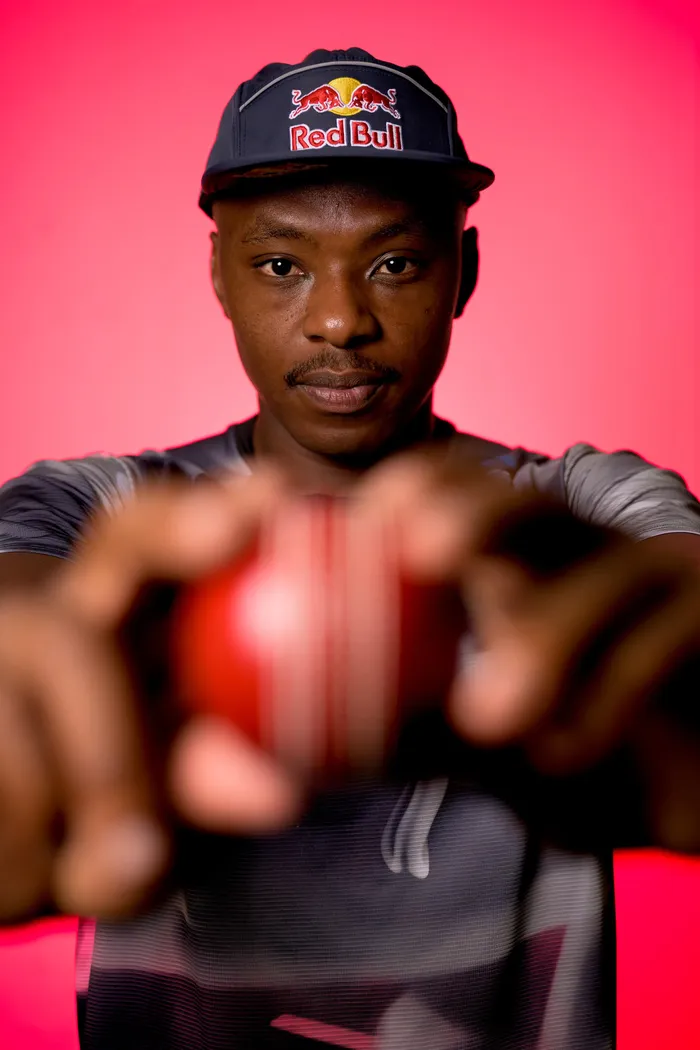EXCLUSIVE: From Lord's to Lahore, Kagiso Rabada ready to lead Proteas' WTC defence
SA TOUR OF PAKISTAN

Proteas fast bowler Kagiso Rabada. Picture: Red Bull Supplied
Image: Red Bull Supplied
The year 2000. Or Y2K. A computer bug which petrified the world into stockpiling food and sanitary supplies.
It did not stop Hollywood superstars Brad Pitt and Jennifer Aniston from tying the knot. Or Christina Aguilera winning Best New Artist at the 42nd Grammy Awards at the turn of the millennium.
The Proteas also won their first - and still only - Test series in India when Nicky Boje spun Hansie Cronje’s Proteas to an innings and 71-run-victory in the second Test in Bengaluru.
Kagiso Rabada was just four years old at the time, and probably more interested in the Playstation 2 gaming console that was just released, than anything happening on the cricket field.
“We want to be the first team to win in India,” Rabada tells Independent Newspapers in an exclusive interview organised by Red Bull.
When I interject and inform Rabada that the Proteas’ have indeed conquered the Asian fortress, he smiles and responds with “Oh ok, hopefully we can take some of their blessings.”
The Proteas’ record in Pakistan is only marginally better with the last of only two series victories having been achieved way back in 2007/08.
Rabada’s memory loss may be due to his personal experience with joyous moments on the subcontinent being rare. Since his debut in Mohali a decade ago, the 30-year-old has yet to be on the winning side in a single Test - let alone series - in either Pakistan or India.
It’s been hard toil for the Proteas spearhead, but it's this disappointment that now fuels his desire to be successful on the upcoming tours.
“Big work ahead, subcontinent tours,” he said. “What's obvious that we want to go and do, that I can tell you, is we want to go there and win.”
It’s visibly noticeable how the fire within Rabada’s eyes starts to light up. It’s the very same glint that was prevalent for four absorbing days during the WTC Final in London when Rabada transformed Lord’s into his playground to unburden the Proteas Men’s team of 27 years of ICC tournament disappointment.
He would go on to call it the Proteas’ Long Walk to Freedom, in reference to former State President Nelson Mandela's time spent in incarceration.
But as much as the nation revelled in the Proteas’ success, the WTC Final triumph was personal for Rabada. He had just returned from a drug scandal that threatened to derail his poster boy image.
Equally, genuine legends of the game are not judged solely on their statistics - he is fastest bowler to reach 300 Test wickets in terms of balls bowled eclipsing the great Waqar Younis - but also on the major silverware they drive their teams to.
Think about it in football terms. No matter how many Ballon d'Ors Cristiano Ronaldo and Lionel Messi may have won, their “GOAT” comparisons would always have fallen short with the likes Pele or Diego Maradona had they not stood on the podium raising the Euro Championship and Fifa World Cup trophies.
Radaba therefore feels almost a personal responsibility to hold on to the coveted golden trophy, starting in the first Test against Pakistan in Lahore on Sunday.
“You know, starting the defence of this mace. Yeah, everyone wants it,” he said.
“Everyone wants it. But in saying that, you've just got to forget about all that external stuff. And when we get together, it's just about zoning into what we want to go and do.”
For years Rabada has virtually carried the Proteas single-handedly on his broad shoulders. He will now also be without his longtime new-ball partner Lungi Ngidi, who recently married his longtime girlfriend.
"Another one bites the dust," chuckles Rabada. "There's a bit of pressure on me now. I'm taking the ball in the World Cup final over (instead of walking down the aisle)."
"But yeah, he (Ngidi) is not in the Test squad, so, yeah, maybe Shuks (Proteas coach Shukri Conrad) missed a trick bowl to more cutters."
Unlike at home in South Africa, and in places like England and Australia where the ball moves appreciably both through the air and off the surface, which allows the new-ball bowlers to strike regularly, the patience levels need to be much greater on the subcontinent.
Rabada feels that he has garnered enough experience over the years to now put it to the test.
“I think what I've learned over the years is, you've got to be creative in how you want to get your wickets,” he said.
“There's not a lot of movement there. So, you're probably looking at different lines, different lengths.
“I mean, Cricket 101, subcontinent, bowl straight, try and get the wickets in play and LBW in play. And, you know, the short catches, the mid-wicket, the short mid-wicket, the short cover.
“And then understanding the pace of the wickets and then trying to set up batsmen with something that's unique, you know, something that you're not expecting.”
South Africa Test tour of Pakistan schedule
- 1st Test: October 12–16, Lahore
- 2nd Test: October 20–24, Rawalpindi
South Africa Test tour of India schedule
- 1st Test: November 14-18, Eden Gardens Kolkata
- 2nd Test: November 22-26, Guwahati
Related Topics: